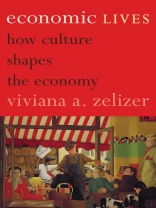Revealing the human side of economic life
Over the past three decades, economic sociology has been revealing how culture shapes economic life even while economic facts affect social relationships. This work has transformed the field into a flourishing and increasingly influential discipline. No one has played a greater role in this development than Viviana Zelizer, one of the world’s leading sociologists. Economic Lives synthesizes and extends her most important work to date, demonstrating the full breadth and range of her field-defining contributions in a single volume for the first time.
Economic Lives shows how shared cultural understandings and interpersonal relations shape everyday economic activities. Far from being simple responses to narrow individual incentives and preferences, economic actions emerge, persist, and are transformed by our relations to others. Distilling three decades of research, the book offers a distinctive vision of economic activity that brings out the hidden meanings and social actions behind the supposedly impersonal worlds of production, consumption, and asset transfer. Economic Lives ranges broadly from life insurance marketing, corporate ethics, household budgets, and migrant remittances to caring labor, workplace romance, baby markets, and payments for sex. These examples demonstrate an alternative approach to explaining how we manage economic activity—as well as a different way of understanding why conventional economic theory has proved incapable of predicting or responding to recent economic crises.
Providing an important perspective on the recent past and possible futures of a growing field, Economic Lives promises to be widely read and discussed.
About the author
Viviana A. Zelizer is the Lloyd Cotsen ‘50 Professor of Sociology at Princeton University. She is the author of
The Purchase of Intimacy,
The Social Meaning of Money,
Pricing the Priceless Child (all Princeton), and
Morals and Markets: The Development of Life Insurance in the United States.












